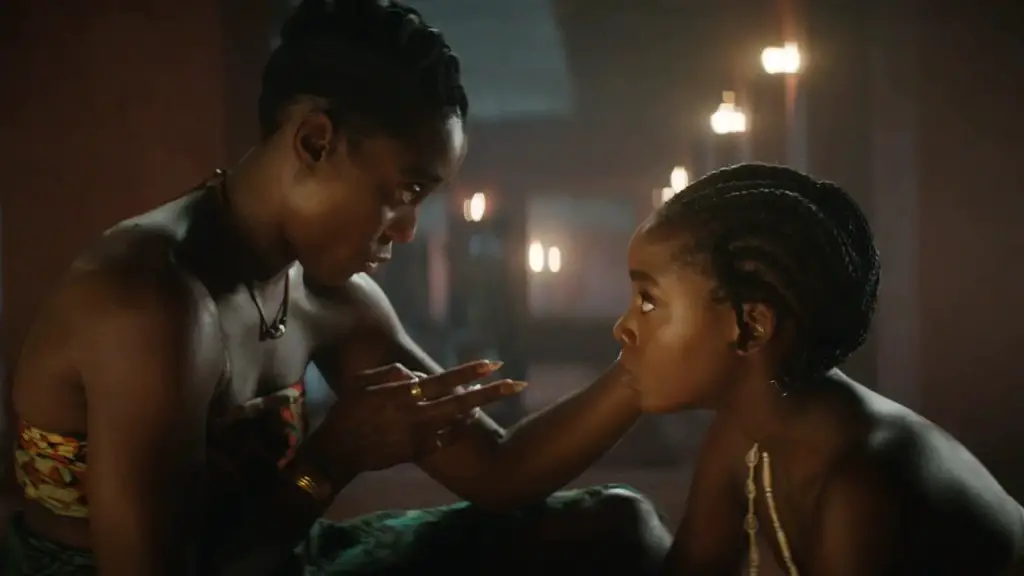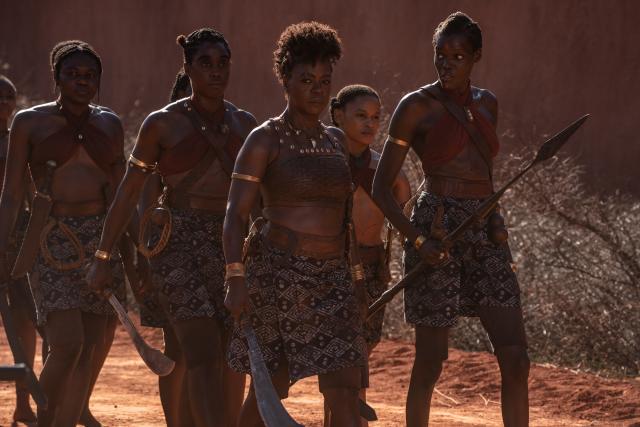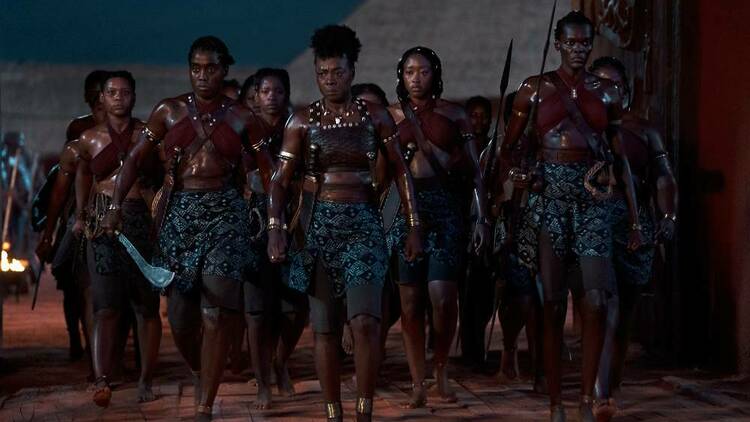While sitting in the theater watching The Woman King, I found myself in complete awe that it took seven years for a film like this to be seen. Over the years, there have been tons of battle epics out there for the world to see. But none like this one. I’ve said it time and time again, stories involving Black historic figures are few and far between. We still have so many more that remain to be told. That’s why I am happy we got The Woman King.
The Woman King, which was inspired by true events, tells the story of an all-female unit of warriors known as the Agojie. They were fierce warriors tasked with protecting their home, the African Kingdom of Dahomey, in the 1800s. The story follows General Nanisca, played by Oscar-winner Viola Davis, as she trains the next generation of recruits including a young girl named Nawi (Thuso Mbedu). The film follows them as they all prepare for battle against an enemy determined to destroy their way of life.

From the moment The Woman King opens, you are transported right into 1823. Director Gina Prince-Bythewood throws you right in the middle of a battle. And, from then, on you know what kind of film you’re in for. The Agojie warriors are extremely badass and incredibly fearless. They take down their enemies without an ounce of hesitation. They are highly respected by the people they protect, and many women want to join their army including Nawi.

Nawi, who Mbedu plays beautifully, doesn’t shy away from a fight, but she’s got a lot to learn. And that’s where Lashana Lynch’s character Izogie comes in. Izogie trains all of the new recruits, and she basically takes Nawi under her wing. Lynch does an amazing job of playing the mentor, who also feels like the big sister, who will ride for you and call you on your crap. The reason it’s so important for all of the women to prepare and take what they are doing seriously is that they have a serious threat heading their way.
The people of Dahomey including King Ghezo, who John Boyega plays so well, face constant threats. Those threats are often domestic as they face off against other tribes like the Oyo lead by Oba (Jimmy Odukoya), who likes to terrorize the people of Dahomey constantly. And of course, they also face the threat of colonization by the Europeans engaging in slave trade.
The Woman King does not gloss over the Dahomey’s involvement in the slave trade.
One of the things that Prince-Bythewood doesn’t gloss over, which I appreciated, was the fact that the African tribes were also engaged in the slave trade.
At this very moment, there are hashtags floating around encouraging people to boycott The Woman King. Those engaging feel it watered down and hid the fact that Africans themselves participated in slave trade. First of all, I think that is a horrible idea. As a Black person, I think it is important to support our Black people when they are making films like these. Like Davis said during the #TakeUpSpace panel at the Toronto International Film Festival, we need to uplift our people. Boycotting a film like this is not the way to do that. And we most certainly won’t get any more if we aren’t even showing up.

Back to the issue of “watering down.” I have to ask if the people pushing for the boycott even watched this film. Prince-Bythewood does not deny that the Dahomey tribe was involved in the slave trade. It’s right there in the opening crawl, which breaks down what the Agojie were ultimately fighting for. Not to mention, the slave trade is the very thing that Nanisca (Davis) is attempting to get the people of Dahomey out of when she goes to King Ghezo. The Dahomey have been participating in the slave trade for so long, but Nanisca just knows this is not what they need to do.
The world is changing in a big way. Nanisca does not feel that they need to continue to trade their own people for what they need. That part of the story is the basis of the entire film. King Ghezo has to try and figure out if this is, in fact, the way they should go. This aspect of the story is only amplified further by the arrival of the Europeans, including Santo Ferreira (the talented Hero Fiennes Tiffin) who has come all the way from Brazil to purchase slaves.

The only reason I can guess that some people feel that this film “watered down” the Dahomey’s involvement in the slave trade was because it wasn’t brutal enough. Maybe they wanted to witness the outright and absolute torture of African people onscreen. In my opinion, we didn’t need that. Prince-Bythewood delivers the message without it. Just look at the scenes of Africans in cages and being objectified on the auction block. What more do you need?
Other important themes
While The Woman King focuses on the Dahomey tribe’s desire to get out of the slave trade, there are other elements of this film that were equally important. One of those elements was showcasing the importance of the women of Dahomey. I was not familiar with this group of fierce warriors until I heard that Davis was training for the film in 2020. With the exception of Black Panther giving us skilled and fearless Black women on screen, this was the first time getting to see a film that focused heavily on the women and kept the men as more of the background.
That onscreen sisterhood was done so beautifully. The battle scenes are phenomenal for sure and keep you on the edge of your seat. But what I really enjoyed even more was the camaraderie. All of the women were from all different walks of life and they became like a family. They bonded together, they danced, and they were with each other in times of joy and pain. As Nanisca, Davis did a wonderful job of conveying the strict general leading her troops. But she also had motherly vibes in the way that she guided them off the battlefield.

I would be remiss if I didn’t give props to the cast on their performances because everyone was just incredible. You can see how much this film meant to them because each cast member gave their all. I spent a lot of time following them all during filming, and while the training was rigorous, it paid off. I already mentioned Lynch, Mbedu, Boyega, and Davis’s performances. But I also have to give a shoutout to Sheila Atim who plays Amenza, as well as Jordan Bolger who played Santo Ferreira’s right hand-man Malik.
While I would have loved to have seen a bit more backstory as to how the Agojie began and even how Nanisca herself came to be one, The Woman King does do a great job at presenting an epic historical tale. My hope is that with this film, it sets a trend where we don’t have to wait another seven years to see ourselves onscreen in a film of this caliber.

